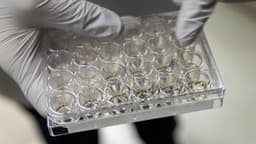Home / Health / Pioneering Cancer Researcher Develops Lifesaving Therapy Against All Odds
Pioneering Cancer Researcher Develops Lifesaving Therapy Against All Odds
17 Nov, 2025
Summary
- Researcher Dr. Carl June overcame funding challenges to develop CAR-T cell therapy
- First 3 patients treated with the therapy are now cancer-free
- June's work has led to FDA approval of multiple CAR-T cell treatments
In November 2025, Dr. Carl June, a renowned cancer researcher at the University of Pennsylvania, is celebrating a remarkable achievement. Just over a decade ago, in January 2011, June and his collaborator Dr. David Porter were on the verge of abandoning their groundbreaking work on a new cancer treatment due to a lack of funding.
The treatment, which involved genetically altering a patient's own T cells to fight the disease, had already shown remarkable success, with the first three patients in a clinical trial becoming cancer-free. However, the lab was running out of money and faced the prospect of having to let go of staff. Unwilling to give up, June and his team decided to take a chance and publish the initial results, hoping that the striking data would attract the necessary funding.
Their gamble paid off. The studies were published in prestigious medical journals, and within days, June received grant offers from the National Cancer Institute and other organizations. This marked a turning point, as June's Chimeric Antigen Receptor T (CAR-T) cell therapy went on to become the first gene therapy approved by the U.S. Food and Drug Administration in 2017 for the treatment of leukemia.
Since then, the FDA has approved additional CAR-T cell treatments for other types of cancer, and June is now working on expanding the therapy to address other medical conditions. His journey has been marked by both personal and professional challenges, including the loss of his first wife, Cynthia, to ovarian cancer. However, June's persistence and his ability to draw on his diverse background, including his time in the U.S. Navy, have been instrumental in his success.
As of November 2025, June's groundbreaking work continues to have a profound impact on the lives of cancer patients, offering hope and a path to a cure for those facing some of the most devastating forms of the disease.



